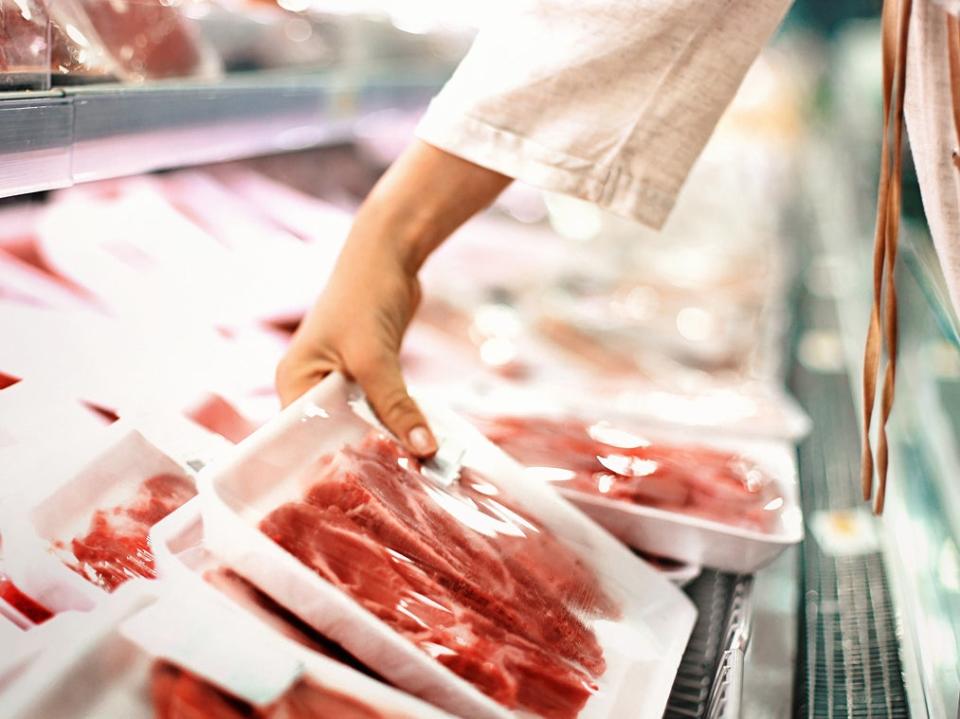Supermarkets are fuelling demand for meat and dairy at expense of the climate, charity says

UK supermarkets are “fueling demand for meat and dairy products” at the expense of the climate, an environmental charity has claimed.
As part of its “Meat Us Halfway” campaign – which is asking supermarkets to halve their meat sales by 2030 – campaign group Feedback ranked the UK’s top 10 supermarket chains on their efforts to reduce the environmental impact when it comes to the products they sell.
The research, published on 17 June, found that organic or free-range products make up less than 20 per cent of options offered by nine of the UK’s biggest supermarkets.
The retailers included in the survey were Tesco, Co-Op, Waitrose, M&S, Sainsbury’s, Aldi, Asda, Morrisons, Iceland and Lidl.
All the supermarkets surveyed, apart from Iceland and Asda, have publically committed to stop selling meat that is linked to deforestation.
“However, they have yet to remove these products, including chicken and pork fed on soya grown in deforested areas, from their shelves,” Feedback said.
According to the organisation, soya production in Brazil has been repeatedly linked to legal and illegal deforestation.
“[With] pretty much any soy-fed meat it is impossible to say that it is definitely ‘deforestation free’, even if the companies which the meat or soy is sourced from have zero-deforestation pledges,” Jessica Sinclair Taylor, head of policy and media at Feedback, told The Independent.
The charity has also criticised supermarket’s use of “made-up farm names”. Of those surveyed, five retailers use these labels to promote meats, such as Tesco’s “Woodside Farms” on its pork products, Aldi’s “Ashfield Farm” and M&S’s “Oakham” chicken.
Feedback said these labels could be “considered misleading and give shoppers the impression of higher production standards than the reality”.
Carina Millstone, executive director of Feedback, said supermarkets are “driving demand” for meat and dairy products.
“UK supermarkets are continuing to drive demand for meat and dairy products that are already responsible for 15 per cent of greenhouse gas emissions – and fuelling deforestation in the Amazon and elsewhere.
“It’s time for supermarkets to step up to the plate, slash their meat and dairy products and offer customers more sustainable and healthier options,” Millstone said.
In December 2020, the government’s Committee on Climate Change recommended that the UK needs to cut its meat and dairy consumption by 20 per cent by 2030 in order to meet its climate commitments.
Over the course of the last year, several supermarkets have expanded their meat-free product ranges, with Tesco announcing in September 2020 that it intends to boost sales of meat alternatives in its stores by 30 per cent in the next five years.
But Feedback’s research found that vegan or vegetarian ready to cook meals make up more than 25 per cent of options in only three supermarkets: Asda, Morrisons and Tesco.
Andrew Opie, the director of Food and Sustainability at the British Retail Consortium (BRC), told The Independent that supermarkets are committed to helping consumers cut their personal carbon emissions.
“Retailers also take their commitment to carbon reduction seriously, with most supermarkets signed up to the BRC’s Climate Action Roadmap which pledges to make retail and its supply chains Net Zero by 2040.
“Part of this commitment will include helping consumers to make decisions that reduce their own personal carbon emissions, as well as supporting farmers in cutting their own emissions.
“At the same time, supermarkets aim to provide their customers with the best possible value across all their products, this includes not only meat and dairy, but also non-meat and vegan alternatives,” Opie said.
A spokesperson for Iceland told The Independent the supermarket is aware of Feedback’s findings and that it “remains committed to making progress in this area”.
The retailer said it incorporates science-based targets into its plans and aims to become net-zero by 2040.
LIDL told The Independent it is disappointed with the charity’s findings, and it is already working towards all of the points identified.
“We are confident of improving our position in the future and look forward to sharing our developments in due course,” it said.
The Independent has contacted the supermarkets mentioned in this story for comment.
Read More
Watch live as Joe Biden signs Juneteenth National Independence Day Act
Supermarkets suspend farm where workers kicked pigs and dying animals left to rot among living

 Yahoo Finance
Yahoo Finance 